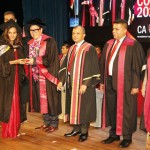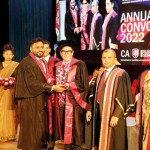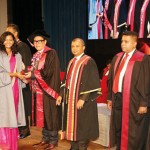The Formal Education System in Sri Lanka Does not Address True Interests and Authentic Talents of a Student
View(s):Sri Lanka has a long history of the evolution of education that dates back two millennia. It believes that with the arrival of Buddhism from India, the education system was established in Buddhist temples. Still, the modern education system was formed by the British Empire in the 19th century with the arrival of Christian missionaries. The Anglican Church had the education system’s monopoly under the British administration.
The education then was not given free of charge, but in 1938, C.W.W Kannangara initiated establishing a free education system on the Island to provide an excellent education to all children. There are 11,091 government schools with a student population of 4.2 million and 265,394 teachers and fall susceptible to both the central government and the provincial councils, maintained by the government in part of the free education system in Sri Lanka with three types of National schools, Provincial schools, and Pirivens.
- CA Sri Lanka USQ MBA Recipient.
- CA Sri Lanka Postgraduate Diploma Recipient.
- CA Sri Lanka Executive Diploma Recipient.
There are five basic levels of education in the Sri Lankan education system: Primary, Junior Secondary, Senior Secondary, Collegiate, and tertiary. It is a government regulation that all children should attend school until grade 9. Still, the ministry of education advises all students to continue their studies until the General Certificate of Education Ordinary Level (G.C.E O/L). Quite a several students fail to complete grade 9 and G.C.E O/L due to poor economy, lack of food, clothing, transportation, school materials, qualified teachers, and conflict-affected areas. As a result, they are not recognised as academically educated. These students join the labour market without proper skills or vocational training. This is a severe problem in the Sri Lankan economy.
However, in our formal education system, it is not practiced and should be designed to serve the needs of the education of all children in Sri Lanka. The primary and secondary education system provides a high literacy rate in Sri Lanka. According to the World Bank report admission rate for primary education is 99%, and for senior secondary education drops by 70%. Still, it is considered an extremely high level of education in Sri Lanka compared to other developed countries. While Sri Lankan education is well ahead compared to the Asian region, at the school level education gap occurs in producing a country’s skilled learned and technical professionals concerning human capital development.
Today, the education system in Sri Lanka is facing a massive crisis because of the rigid syllabus, heavy content, a stereotype of learning, more academic and examination-oriented. Hence, heavy examination orientation has unpleasantly affected the student’s total development, e.g., personality development, soft skills development, co-curricular and social activities at school. The education process is passive, and the teaching mode depends on textbook teaching with an unchanging set of subjects. There is little student-centered learning with a student’s interest in school-based assessment (SBA). A child is more toward paper-pencil tests than the activity-based education with the public examinations, focusing on the power of memorisation conducted by the Ministry of Education. A student has to face three main examinations in primary and secondary education: Grade 5 Scholar Ship examination, G.C.E O/L, and G.C.E A/L examination conducted by the Department of Education. These national examinations mainly focus on memorising content and excellence in educational achievement. These examinations focus less on a child’s latent skills, capabilities, competencies, beliefs, proficiencies, interests, and attitudes. It is concentrated only on identifying how many have successfully passed the examinations by maintaining the data in the Department of Education. These public examinations and massive overloading syllabus have created pressure and stress on students and parents.
Another serious issue is students are forced to go to private tuition classes. In Sri Lanka, national school qualifying examinations are highly competitive. The government authority does not govern these classes, but many parents send their children to pass the highly competitive school qualifying examinations. Most students attend private tuition classes for the national school qualifying examinations at the end of grade 5, grade 11, and grade 13. Still, today some parents forcefully send children for tuition classes from grade one. This has created severe mental sickness in students. Though the special parliamentary committee is appointed to look into this matter, the overloaded examination system and tuition mafia have destroyed their childhood.
Sri Lankan education system is in danger due to the COVID -19 pandemic, current political and economic crises, lack of transportation, fuel problem, continuous power cuts, and constant protests. This has been created by school closures and deprived of the structure and education system. In Sri Lanka, closing schools for one day cause a loss of millions in learning and teaching hours. Many schools implemented distance learning during the pandemic with minimal facilities for computers, smartphones, and internet connections.
Still, up to now, one-third of students did not benefit from e-learning opportunities. Due to the high cost of living with inflation, many parents have lost their income generation. Parents of school-going children have to spend more than their salary on private tuition and data packages for online classes for their children. Private tuition is more expensive and converts a business, but it has developed a norm for the national examinations. Many teachers encourage private tuition classes for their students, and some conduct classes during school. Today, private tuition classes have become a deadly virus. Extra teaching is suitable for children, but their development with their interest and talent is deprived.
Sri Lanka has achieved a high literacy rate but cannot provide quality education to students. With globalisation, people live in a knowledge society where information and knowledge play a vital role, transforming to meet the demands of the knowledge-based economy in a country with a competitive advantage. In a knowledge-based society education system transfers the quality of human resources and the workforce by adding value to the economy. However, the Sri Lankan education system has failed to replace the old curriculum reform with a meaningful, creative and activity-based method. Therefore, our education system must respond to the labour market’s request. Furthermore, our traditional and orthodox education system must change from teacher-centered to student-centered with 21st-century learning skills. A child is compared against the other student, and no real value is added to the individual’s skill. Education reforms aim to produce information technology, be technically skilled, think critically, logically, inductively, analytically, be a team member, respect the right of others, be sensitive, unbiased, friendly, compassionate, and not direct memorising only subject matters. A successful school curriculum helps students develop both hard and soft skills with continuous feedback from assessments and advice from teachers, preparing them as successful members of the knowledge society to live as good human beings. Thus, the current position of our education system proved during the lockdowns the difficulty that the teachers and students had to undergo due to lack of computer and internet facilities and technical knowledge. There have been curriculum reforms every eight years but have failed to form a system to develop a student’s interests and skills. The entire learning focused only on testing the academic content. For instance, today, youth unemployment is very high. Recent university graduates could not find a job in their specialisation and instead found riding Uber Eats. Therefore, the school curriculum should link with the skill and talent of a student by constructing more assessments, not for examinations. There should be a formative value for reviews that a learner achieves the learning outcome. Teachers have more skilled work in correcting evaluations to facilitate learning outcomes properly. Teachers should be given training on writing assessments and testing in their Postgraduate Diploma programmes. Most teachers follow the old fashion paper-pencil work or question papers and test papers to measure cognitive ability in schools and public examinations. Still, the Department of Examination does not recognise the importance of preparing children to meet the knowledge economy. Therefore, there should be a drastic change in the present education system to meet the challenges of the global world.
Rev.Fr. Sharm Dassanayake.
Vice Rector/Principal
St. Sebastian’s College
Moratuwa.
HitAd.lk is the best and biggest mobile phone market in Sri Lanka, and we guarantee you will find what you need here from our extensive listing of mobile phones for sale in Sri Lanka. Whether it’s a budget-priced smartphone for communication, or higher end features with advanced connectivity, there are many different options from which to choose from on our site!





